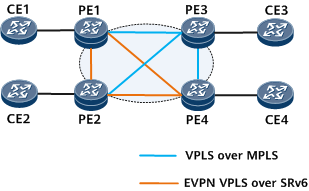Configuring the Co-Existence of VPLS and EVPN VPLS over SRv6
When both a conventional VPLS network and an EVPN VPLS over SRv6 network are deployed, you need to configure the coexistence of VPLS and EVPN VPLS over SRv6.
Context
Conventional L2VPNs use VPLS over MPLS to implement Layer 2 communication. Compared with VPLS, EVPN, a next-generation VPN technology, provides many advantages, such as multi-homing, all-active, and control plane-based MAC address learning. Especially, EVPN over SRv6 can accommodate the growth of IPv6 networks and 5G services. Therefore, VPLS over MPLS is gradually evolving to EVPN over SRv6. However, there are still a large number of existing VPLS services on the live network. If EVPN VPLS over SRv6 services are added, configure the co-existence of VPLS and EVPN VPLS over SRv6 to ensure that both services run properly.
On the network shown in Figure 1, VPLS over MPLS is deployed on PE3, and both VPLS over MPLS and EVPN VPLS over SRv6 are deployed on PE1, PE2, and PE4. In this case, you need to configure the co-existence of VPLS and EVPN VPLS over SRv6 on PE1, PE2, and PE4.
Pre-configuration Tasks
Before configuring the co-existence of VPLS and EVPN VPLS over SRv6, complete the following tasks:
Complete the task of Configuring LDP VPLS or Configuring BGP VPLS between PE3 and PE1, between PE3 and PE2, and between PE3 and PE4.
Complete the task of Configuring EVPN VPLS over SRv6 BE or Configuring EVPN VPLS over SRv6 TE Policy between PE1, PE2, and PE4.
Perform the following steps on PE1, PE2, and PE4.
Procedure
- Run system-view
The system view is displayed.
- Run bridge-domain bd-id
The BD view is displayed.
- Run l2 binding vsi vsi-name [ pw-tag pw-tag-value ]
The BD is bound to the VSI.
- Run evpn binding vpn-instance vpn-instance-name
The BD is bound to the EVPN instance.
- Run commit
The configuration is committed.
Verifying the Configuration
Run the display bgp evpn { all | route-distinguisher route-distinguisher | vpn-instance vpn-instance-name } routing-table { ad-route | es-route | inclusive-route | mac-route | prefix-route } prefix command on PE1, PE2, and PE4 to check detailed information about BGP EVPN routes, including PW information.
In a scenario where a CE is dual-homed to PEs, run the display evpn vpn-instance name vpn-instance-name df result [ esi esi ] command on PEs to check the DF election result of the EVPN instance, including PW information.

